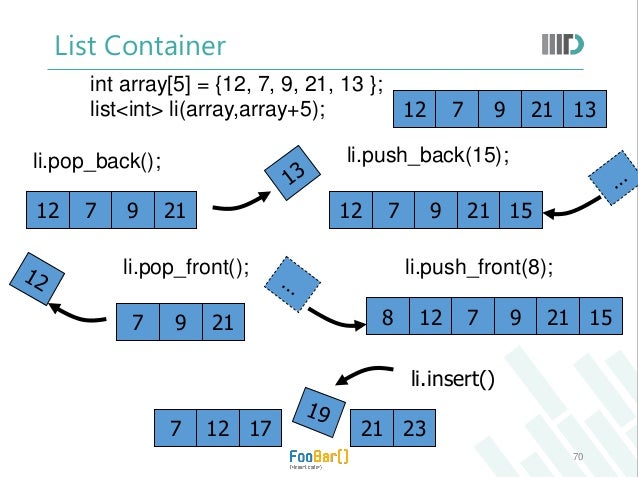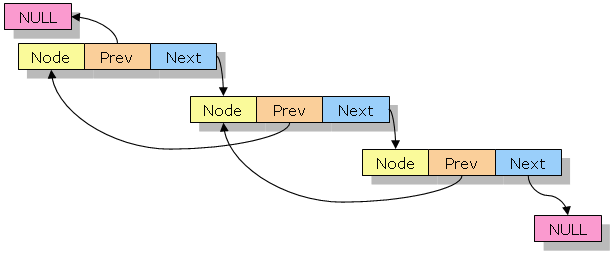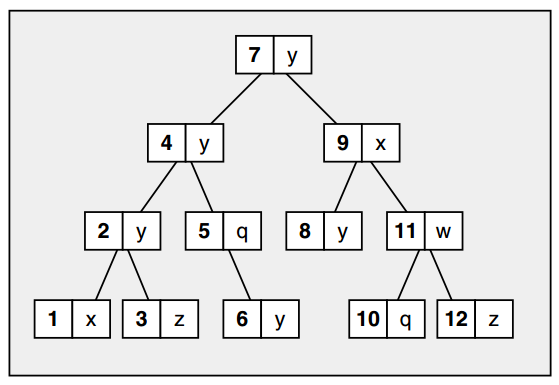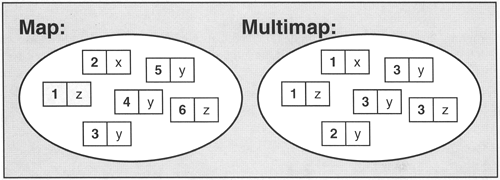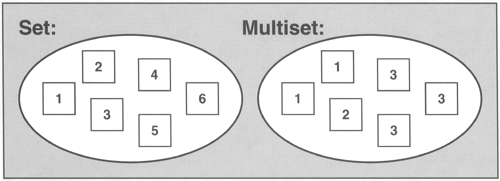T) STL Containers - kalinosia/cpp GitHub Wiki
- Something what can store multiple elements of the same type
- Container manages memory, which is needed to store its elements
- Three classes of containers can be distinguished:
- sequence containers
- associative containers
- unordered associative containers
- https://en.cppreference.com/w/cpp/container
- Array with a dynamic size, which is cache friendly.
- In case of being full, it allocates bigger chunk of memory.
- During reallocation, it reserves more memory than is needed.
template < class T, class Alloc = allocator > class vector; // generic template
std::vector<std::string> surnames; //or double.... or int :)
std::vector<double> v2(10); //ten elements (0)
std::vector<int> primes{2, 3, 5, 7, 11};
std::cout<< "Front: " << primes.front() << '\n'; // Front: 2
std::cout<< "Back:" << primes.back() << '\n'; // Back: 11
std::cout<<primes.size()<<std::endl; //5
template <typename ForwardIterator>
void displayRange(ForwardIterator first, ForwardIterator last)
{
while(first!= last) {
std::cout<< *first++ << ", ";
}
}
std::vector<int>v1;
v1.assign(3,50); //50, 50, 50
v1.push_back(25);
//v1.assign({3});//if i give, this, will be only 3 in vector
v1.at(1) = 88; // Set element 1
•Public methods related to vector's capacity:
- size
- empty
- capacity
- reserve
- shrink_to_fit
- max_size
more: https://en.cppreference.com/w/cpp/container/vector
- Fixed size array, which is cache friendly.
- Zero-overhead in comparison to C-style array.
- Strong typing.
- Provides STL container interface.
-
How to access elements:
- at / operator[]
- front / back
- data
- Using iterators:
- begin / cbegin
- end / cend
- rbegin/ crbegin
- rend / crend
-
std::array::iterator is a random-access iterator
-
Public methods related to array's capacity:
- size
- empty
- max_size
-
Other methods:
- fill
- swap
-
In case of arraywe can use comparison operators.
std::array<int, 5> numbers;
std::cout<< std::boolalpha;
std::cout<< "Isempty: " << numbers.empty() << '\n';
std::cout<< "Size: " << numbers.size() << '\n';
std::cout<< "Max size: " << numbers.max_size();
std::array<int, 3> a1 {1, 2, 3};
std::array<int, 3> a2 {3, 3, 3};
a1.swap(a2);
std::printf("a1\n");
displayArray(a1);
std::printf("a2\n");
displayArray(a2);
std::array<int, 3> numbers;
numbers.fill(7);
- Doubly-linked list.
- Random access is not supported.
- Not cache friendly.
- May lead to memory fragmentation.
- Fast insert/remove operations.
-
How to access elements:
- front / back
- Using iterators:
- begin / cbegin
- end / cend
- rbegin/ crbegin
- rend / crend
-
std::list::iterator is a bidirectional iterator
-
How to modify list:
- push_back/ push_front
- pop_back/ pop_front
- emplace_back/ emplace_front
- insert / emplace
- erase
- clear
- resize
- swap
-
Special operations of std::list:
- sort
- merge
- splice
- reverse
- unique
- remove / remove_if
std::list<int> l1; //l1.size()=0
l1.push_back(3);
l1.push_front(1);
l1.insert(++l1.begin(), 2); //l1.begin()-iterator, żeby odczytać *l1.begin(), ++l1.begin()to już następne miejsce(...)l[0]++=>l[1]
std::list<int> l2 {10, 11, 12, 13};
l1.swap(l2); //różne długości , można
l1.resize(2); //zmniejszenie do 2 elementów - obcięcie, jak więcej to 0
l3.sort(); //sort jak niesortowana, std::string też
l2.remove_if( [](int n) { return n==1; }); //usuń jedynki, lub n>10 usuń jak większe od 10...
l4.unique(); //usuwa powtarzające się...unikalna lista
//ODWRÓCONA BO R jak reverse !!!!!!!!!!!!! rbegin
for (auto ritr = l3.rbegin(); ritr != l3.rend(); ++ritr) { //operacja na iteratorach
std::cout << *ritr << " "; //wypisuje od ostatniego
}
Lista porozrzucane elementy w porównaniu do vectora, ale łatwiej dodać w środek element, bo w vectorze trzeba wszystko poprzesuwać (lista szybszy insert). Nie są w jednym bloku, może prowadzić do fragmentacji pamięci.

- How to access elements:
- front
- Using iterators:
- begin / cbegin
- end / cend
- before_begin, cbefore_begin
- std::forward_list::iterator is a forward iterator
- How to modify forward_list:
- push_front/ emplace_front/ pop_front
- insert_after/ emplace_after
- clear
- erase_after
- swap
- resize
- Special operations of forward_list:
- sort
- merge
- reverse
- splice_after
- unique
- remove / remove_if
Kolejka z dwoma końcami.

- Double-ended queue –often implemented asmany chunks of memory, which are allocated independently.
- In case of being full, it reallocates memory.
- Supports random access.
- Fast insert/remove operations at the beginning/end.
- How to access elements:
- at / operator[]
- front / back
- Using iterators:
- begin / cbegin
- end / cend
- rbegin/ crbegin
- rend / crend
- std::deque::iterator is a random-access iterator
- Public methods related to deque's capacity:
- size
- empty
- shrink_to_fit
- max_size
- In case of deque we can use comparison operators.
- How to modify deque:
- push_back/ pop_back
- push_front/ pop_front
- insert / emplace
- emplace_front/ emplace_back
- resize
- swap
- erase
- clear
std::deque<int> d1 {1, 4, 3, 1, 3, 2 };
d1.pop_front();
d1.pop_back();
d1.push_front(9090);
d1.push_back(32132);
std::set<std::string> set;
set.insert("Pan X");
set.insert("Pani Y");
set.insert("Pan X");
for (auto s : set) {
std::cout << s << " ";
}
d1.at(1) = 88; //drugi element (od 0) = 88
std::cout<<data.at(0)<<"\n"; //jaki jest element 0
- Key-Value pairs, where key is unique.
- Elements stored inside are sorted by key.
- Usually implemented astree.
- Complexity of search/insert/remove methods is logarithmic.
- Key-Value pairs, where key is unique.
- Elements stored inside are sorted by key.
- Usually implemented as tree.
- Complexity of search/insert/remove methods is logarithmic.
`map<int, char> map1; map1[1]='a';
- Key-Value pairs
- Elements stored inside are sorted by key.
- Usually implemented astree.
- Complexity of search/insert/remove methods is logarithmic.
- How to access elements:
- at / operator[] (only std::map)
- Using iterators:
- begin / cbegin
- end / cend
- rbegin/ crbegin
- rend / crend
- lower_bound/ upper_bound
- equal_range
- find
- std::map::iterator and std::multimap::iterator are bidirectional iterators
- Public methods related to map's capacity:
- size
- empty
- max_size
- count
- In case of map we can use comparison operators.
- How to modify map:
- insert / emplace
- emplace_hint
- erase
- swap
- clear
std::map<std::string, int> myMap;
myMap[“Tommy”] = 21;
std::cout<< “Tommy’snumber:” << myMap[“Tommy”];
std::multimap<std::string, int> grades;
conststd::string studentName= “Tommy”;
grades.insert(std::make_pair(studentName, 5));
grades.insert(std::make_pair(studentName, 3));
grades.insert(std::make_pair(studentName, 4));
auto tommysGrades= grades.equal_range(studentName);
std::cout<< “Tommy’sgrades: “;
displayRange(tommysGrades.first, tommysGrades.second);
- Contains unique values.
- Elements stored inside are sorted.
- Usually implemented astree.
- The complexity of search/insert/remove is logarithmic.
- Elements stored inside are sorted by value.
- Usually implemented astree.
- The complexity of search/insert/remove is logarithmic.
- How to access elements:
*Using iterators:
- begin / cbegin
- end / cend
- rbegin/ crbegin
- rend / crend
- lower_bound/ upper_bound
- equal_range
- find
- std::set::iterator and std::multiset::iterator are bidirectional iterators
- Public methods related to set's capacity:
- size
- empty
- max_size
- count
- In case of set we can use comparison operators.
- How to modify set:
- insert / emplace
- emplace_hint
- erase
- swap
- clear
Unordered associative containers available in STL:
- Key-Value pairs, where key is unique.
- Hash table (uses hash function to transform key into an index).
- Collision handling is needed.
- Key-Value pairs.
- Hash table (uses hash function to transform key into an index).
- Collision handling is needed.
- Uniquevalues.
- Hash table (uses hash function to transform key into an index).
- Collision handling is needed.
- Hash table (uses hash function to transform key into an index).
- Collision handling is needed.
- Adapts container and provides LIFO (Last in –first out) interface.
- Container type has to supports methods as:
- push_back
- pop_back
- back
- Methods:
- top / pop
- push / emplace
- swap / empty / size
- Adapts container and provides FIFO (First in –first out) interface.
- Container type has to supports methods as:
- push_back
- pop_front
- back
- front
- Methods:
- front / back
- push / emplace / pop
- swap / empty / size
- Elements are prioritized according to comparator.
- Container type has to supports methods as:
- push_back
- pop_back
- back
- Methods:
- top
- push / emplace / pop
- swap / empty / size

